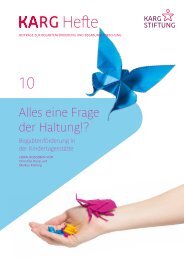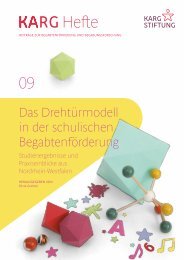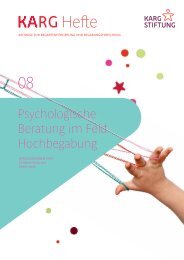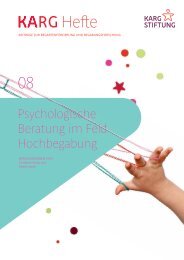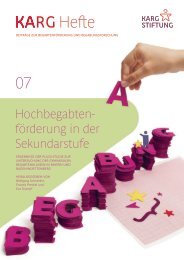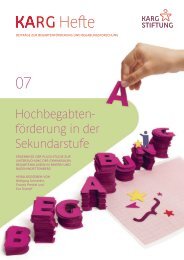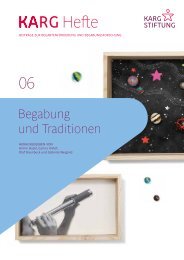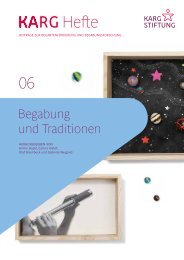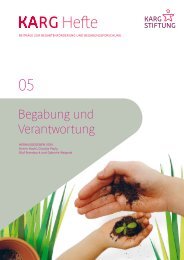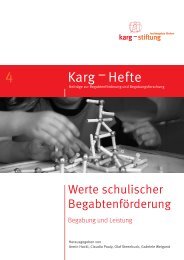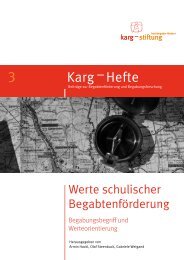FAQS: Frequently asked questions about giftedness
The Karg Foundation receives a lot of questions on the subject of giftedness—FAQs (Frequently Asked Questions)—far more often indeed than it did ten years ago. And this is a good thing! Many people involved in the educational processes of children have come to realize that giftedness can also be a fundamental personality trait of children and adolescents. The Karg Foundation wants to answer the questions you may have not only as educational and psychological professionals in educational institutions or working as educational providers, policy makers, or in training and further education institutes, but as parents and gifted people also: What is giftedness? How can it be identified? Who can provide advise for gifted children and their families? How can they be supported in the best possible way?
The Karg Foundation receives a lot of questions on the subject of giftedness—FAQs (Frequently Asked Questions)—far more often indeed than it did ten years ago. And this is a good thing! Many people involved in the educational processes of children have come to realize that giftedness can also be a fundamental personality trait of children and adolescents.
The Karg Foundation wants to answer the questions you may have not only as educational and psychological professionals in educational institutions or working as educational providers, policy makers, or in training and further education institutes, but as parents and gifted people also: What is giftedness? How can it be identified? Who can provide advise for gifted children and their families? How can they be supported in the best possible way?
Create successful ePaper yourself
Turn your PDF publications into a flip-book with our unique Google optimized e-Paper software.
How are children with high<br />
abilities recognized in the Kita?<br />
Preschool children are at an age where they develop<br />
their first specific interests—often through exploration<br />
and playful encounters with an object or an activity. Ideally,<br />
they can find out what suits them best by taking advantage<br />
of the wide range of activities and stimuli provided by the<br />
Kita. However, to identify whether a child is particularly<br />
gifted in a specific area, it is necessary to provide activities<br />
that allow children to test themselves at different levels of<br />
difficulty, regardless of their age. Suitable activities are<br />
those that place varying demands on the children and give<br />
them the freedom to decide how they want to participate.<br />
Consequently, how the support programs in Kitas are designed<br />
already represents an important prerequisite for the<br />
recognition of specific abilities and talents.<br />
Furthermore, identifying <strong>giftedness</strong> should be understood<br />
as a process. Young children develop very differently.<br />
A child’s accelerated development in one or more areas<br />
can also be an expression of a temporary developmental<br />
advantage over peers. It is therefore important to observe<br />
and assess a child’s development continuously and over<br />
a longer period of time. Methods that focus on children’s<br />
activities and learning and which are utilized routinely are<br />
particularly appropriate. Together with colleagues and<br />
parents, these observations of a child can then be reviewed<br />
on an ongoing basis.<br />
First indications of potential <strong>giftedness</strong> can be a strong<br />
sense of curiosity and a high learning ability at the same<br />
time. Young gifted children are often identified by their<br />
intense and persistent interest in knowledge, remarkable<br />
ability to grasp things very quickly, extraordinary capacity<br />
to retain information, and rapid development of competencies.<br />
They also often demonstrate a high level of determination<br />
and perseverance in their efforts to acquire<br />
knowledge or new skills. Developmentally, targeted interests<br />
are still rare at preschool age, but an early, intense<br />
interest may indicate a high domain-specific ability for<br />
this very reason.<br />
The question “How can gifted children be identified<br />
in the Kita?” is explored in more detail in the Karg Foundation’s<br />
special edition, “<strong>Frequently</strong> Asked Questions<br />
(FAQs) <strong>about</strong> <strong>giftedness</strong> in early childhood”.<br />
https://www.fachportal-hochbegabung.de/<br />
faqs-early-childhood/<br />
46 47





